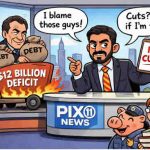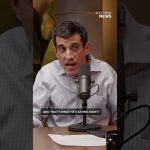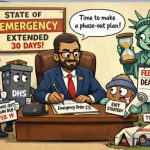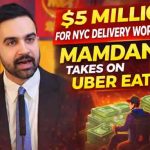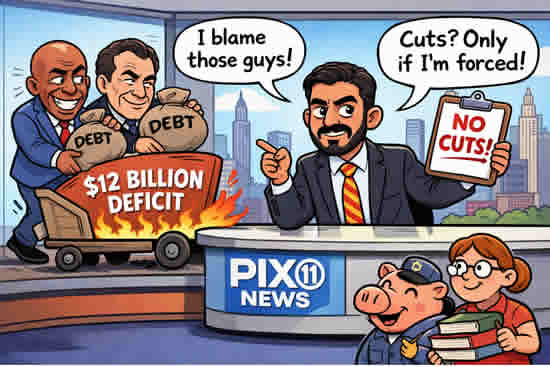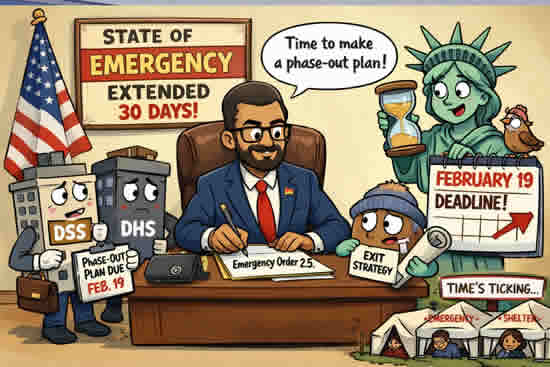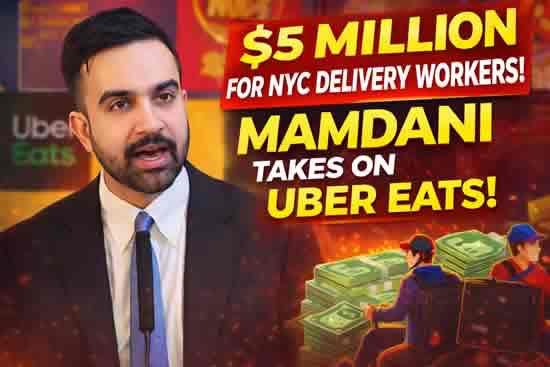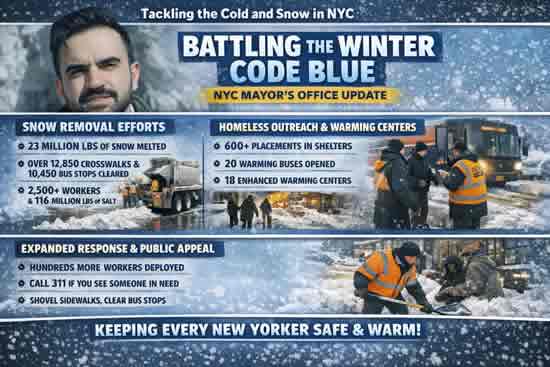In a July 18, 2025, episode of The Odd Lots Podcast, New York City Mayor Eric Adams discussed revitalizing the city’s nightlife and addressing its housing crisis. He emphasized nightlife’s $30 billion economic impact, highlighting its recovery post-COVID with booming restaurant reservations and Broadway’s record-breaking year. On housing, Adams outlined ambitious plans, including surpassing previous administrations in affordable housing construction, integrating NYCHA into development plans, and implementing the “City of Yes” initiative to build housing citywide. He addressed delays in projects like Elizabeth Street Garden, attributing them to community opposition but noting a resolution that increased housing units. Adams also tackled crime, quality of life issues, and his approach to working with federal authorities, including ICE, while maintaining NYC’s sanctuary city status for non-criminal enforcement.
Transcript: Mayor Adams Appears on The Odd Lots Podcast
Joe Weisenthal: Hello, and welcome to another episode of the Odd Lots podcast. I’m Joe Weisenthal.
Tracy Alloway: And I’m Tracy Alloway.
Weisenthal: Tracy, we have a special episode of the podcast today, which needs very little introduction, but we are speaking to the mayor.
Alloway: I love our transition to local city reporters.
Weisenthal: It’s really fun learning about our city. Mayor Adams, New York City Mayor Adams, thank you so much for coming on Odd Lots.
Mayor Eric Adams: Thank you. Thank you. I think this is my second time this week or was it last week? The days go fast, but it’s great here being at Bloomberg.
Weisenthal: Thank you so much. I read an article recently from the journalist, Derek Thompson. He was talking about the death of partying in America. People apparently don’t party as much as they used to. New York City people still party, but like, you know, there aren’t as many 24 hour clubs they used to be. Apparently there’s fewer 4am liquor licenses, etc.
You’re a man who appreciates nightlife and partying. What happened? Why don’t people party as much as they used to?
Mayor Adams: Great question. And first of all, why do I appreciate the nightlife? It’s a $30 billion industry. And we viewed the city, often as mayors, we viewed it as nine to five, but it’s not. When I was a police officer, I worked overnights, midnights. And when I go into a nightlife, a restaurant, I walk in the kitchen, I talk to the dishwasher. I talk to the busboy or girl. Those are everyday working class people.
And I knew when I came back after COVID, I had to turn our nightlife around. And we did that. You can’t get reservations in the city anymore. Broadway had the best 12 months in the history of the city. And part of coming back out at night is what is our signature? New York, the city.
Weisenthal: So there’s no party crisis?
Mayor Adams: No, [there’s] not.
Alloway: But stuff still shuts down earlier than it used to.
Mayor Adams: No, it does. And part of the problem, I believe you have far too many people on community boards that have been for a long time and they’re not connecting the economics with their desire really not to have any nightlife.
Nightlife is important to the community. It’s allowed to let off some steam, networking, really collaborating. Listen, you come to New York, you’re going to find your mate here because of the diversity of this great city.
Alloway: I wanted to ask about some other specific policy proposals, specifically housing. And I went to your website and I saw the sort of summary of your proposals. And then I clicked into learn more. And it took me to your previous accomplishments under your first term. So I’m really curious if you could maybe broaden out some of your housing policies. What exactly are you talking about here?
Mayor Adams: Well, first, let’s look at the fact that when you look at shovels in the ground and what we’re proposing in our rezoning, including the most comprehensive housing reform in the history of the city. 60 years previously was the first time we really started looking at housing and some of the reform.
We’re going to build more housing in one term than the 12 years under Bloomberg’s, the eight years under de Blasio combined, in one term. And $25 billion we put into our 10-year capital plan. In addition to that, for the first time in history, we are including NYCHA housing into the plan. So we’re looking at a couple of different locations.
Number one, we saw the federal and state government walk away from NYCHA. NYCHA has an $88 billion capital problem. We had to find new ways of building on NYCHA. We did the land trust. Many people tried. We got it done. We’re also doing the RAD program. Many people have attempted to do it. We got it done.
The amazing project that we are getting ready to do in Riis Houses, where we’re going to tear down old buildings, build new buildings and without zero displacement of tenants. That’s how we deal with the NYCHA issue.
Then we realized that if we want to build more housing, we have to build everywhere. It was unbelievable how many elected officials were stopping that building. 59 community boards, 10 of those 59 were building more affordable housing than 49 combined. So our goal now is to build all over the city. That’s what City of Yes was about. A little more housing in every community that we could allow residents and tenants to stay in their community instead of leaving the city.
So our goal in the future as we move forward, we want to build faster. We want to build more. Drive-by Willets Point right now, 2,400 units of affordable housing that’s there, a new soccer stadium that’s paid private dollars, a new school, new open space. And you see the building is actually going up in the same term. So our focus is building more and building everywhere.
Weisenthal: The first time I ever heard about controversy at the Elizabeth Street Garden was in 2018, I think. And then now it’s 2025 and you’ve come out and said, okay, like, let’s move on. Let’s not continue to fight this. But setting aside whether it was it’s right to use that space for housing or not, like setting aside these questions, why does it take seven years or longer to come to answers on these questions?
Mayor Adams: Great question. And if you do an analysis over all the things that we’ve done, we’ve landed planes that no one else was able to do. When you rid all the noise, take all the noise out of the administration and just say, okay, let’s look at the raw numbers. Like you said, your listeners are sophisticated. Look at the raw numbers.
We were able to land a plane on Governor’s Island. We were able to land a plane in Sunset Park. We’re able to land the plane on these difficult tasks. So what did we do when we brought in Randy Mastro as the first deputy mayor? He looked at it. He says, how can we leverage this space? How can we walk away with a win? We did. Elizabeth Street Garden was going to do about 125 units of housing, 120 units. We’re going to get 625 units of housing.
Weisenthal: But elsewhere, after years of fighting about it.
Mayor Adams: Yes. This is New York. Let’s be clear about the city. Whatever you try to do, we got 8.5 million people, we have 35 million opinions. You’re always going to have New Yorkers, no matter what you attempt to do. But how do we leverage the best for the city?
So we took the concerns of Elizabeth Street Garden. People were concerned about that. They wanted to hold on to the garden. And I said, you got to give me a plan so that I could deal with the number one crisis I have in the city and that is housing. And we were able to leverage that space and walk away with over 600 additional units of affordable housing. That’s a win, no matter how you talk about it.
Alloway: What’s the broad lesson from that experience? Because when we were talking about nightlife just then, you know, it sounds like community groups and special interest groups are still an impediment or an obstacle to some of the things that you seem to want to do. Is there anything you’re thinking about to maybe like encourage more cooperation, build up that City of Yes idea?
Mayor Adams: Yes. And you know, what we witnessed in the city, particularly in our elected officials, our elected officials on Monday, they say housing is right. But on Tuesday, they say not in my district. We don’t want it here. And if I walked away with anything in the last three years and seven months, is that you have to ignore the noise. You have to do what’s best long term for the city.
And it’s a retrospective appreciation of– and if you do an analysis, not only in housing, look how far I was away from where the noise of the leadership of the Democratic Party. When I was talking about taking severe mental health illness off our streets, I got an unbelievable pushback. When I talked about investing in the Police Department, when others were talking, defund the police, everyone was pushing back. And now we see records and levels of decrease in crime.
When I was talking about the cannabis fight, that we had to do something about it. So when you look at where I was, even in housing, everyone was pushing back on the City of Yes until they all came to where we were. And when you live these experiences, you have a different eyesight than others.
So what I want for my local community groups and organizations is to understand we’re in the city together and far too often folks say that, “Listen, I have my backyard, I have my park, I have all that I want. I don’t want any additional people here.” But if you do that, then you’re going to hurt the long term plan of this city.
Weisenthal: So your main opponent in this race has made affordability the sort of cornerstone. And you’ve talked about, obviously, the expansion of affordable housing in New York City under your administration, which is real. Nonetheless, New York City is a crazy expensive place to live. I think it’s worth it because I think it’s the best city in the world. So it’s like, you know what, I’ll pay the high cost of housing here because I love New York City.
But do we just have to accept, you know, sort of in the same way you said, okay, you know, New York’s always going to have 35 million opinions for 8.5 million residents as New York City. Do we just all have to accept that the city has to be incredibly expensive?
Mayor Adams: No, no, we don’t. And what government must do is utilize their powers to help working class people. And when you think about it, that’s what we have done. We put $30 billion back into working class people. And we looked at what is driving the cost.
Number one, as we talked, affordable housing was one area. And we’re doing that. We’re building it. We’re breaking records. Year one, year two, and year three, we build more affordable housing in individual years in any other administration in history. But look at the other areas.
What’s the number one cause of bankruptcy? Medical debt. We are excusing medical debt for low income New Yorkers. Foster care children, 600 to 700 age out every year. They slip through the cracks. They don’t get the support that they deserve. We’re paying their college tuition. And we’re giving them life coaches until they’re 21 instead of aging out at 18 so they don’t slip through the cracks.
Or what hurts women the most, but families in particular? Child care. We dropped the cost of child care from $20 a month to less than $20 a month. We were the first one in 20 years to increase the earned income tax credit. We’re paying for high speed broadband and low income housing and NYCHA and other locales in the process. Reduced the cost of using our subway system for low income New Yorkers.
So the real message is I can’t handle the price of bread, but I can put bread back in the pockets of New Yorkers. And we’ve done it at the sum of $30 billion. So it’s easy to talk about pie in the sky ideas that is not within the span of the control of the mayor, like free buses.
Free buses is a $3 billion price tag. And if you’re stating that the foundation of your plan is based on increasing taxes on high 1 percent earners, when in fact you don’t have the authority to do that, you know who has the authority? Assemblyman. My opponent is an assemblyman. If he couldn’t get it done as an assemblyman, how is he going to get it done as a mayor, particularly when the governor who signs off on it stated that she’s not raising income taxes.
New York City has the highest income tax in the country. The state is the highest in the country. And so what I did, put money back in their pockets. Do you know there’s no income tax for low income New Yorkers in the city because of my Axe the Tax? That is how you look at the power of the Mayor’s Office and say, how do I help working class people?
I’m blown away that he has hijacked the narrative of being a working class mayor and putting money back in the affordability issue when I’ve done it. My record is clear on putting money back in the pockets of working class people.
Alloway: Since we’re talking about your opponent’s policies, Zoran Mamdani, you’ve said that New Yorkers don’t understand what socialism is. Can you give us your definition of socialism? Like what is socialism to you?
Mayor Adams: Well, first, I would say that 70 percent of New Yorkers like the theme and concept of socialism. And many people, if you were to ask, they would tell you they’ve never been to a socialist country. I’ve been to a communist and socialist country. I’ve been to Venezuela. I’ve been to Cuba. I know what rational books are.
I think it is the concept that you’re going to take money from one area of the population and equal it out across the board. And many government-run locales and facilities such as supermarkets. Now, when you do that in concept, it sounds good. But if you open a government-run supermarket, you’re going to kill the bodega industry. You’re going to kill the independent supermarket industries.
So I think the whole concept of believing as though resources from the top end, that those who believe that we should not have any billionaires in the city, which I just don’t, it doesn’t balance out because when you look at where the tax dollars come from and spreading the wealth, if you want to use that classification, across the entire population. That doesn’t work for me, it has never worked anywhere on the globe. There’s not one country we can point to that says this concept has been successful.
Alloway: I mean, we do have progressive taxes, though. You just said that lower income New Yorkers don’t have to pay New York tax. So there is an element of that here. Like, is there a point at which it’s too much? Or like, what exactly is the issue?
Mayor Adams: When you say it’s too much, explain it to me more.
Alloway: Like, is there a point at which the redistributive effects?
Weisenthal: Flips into socialism.
Alloway: Yeah, flips into socialism.
Mayor Adams: Well, I think so. I think there’s a balance. And I like to say all the time, I want the person who drives the limousine to get a fair wage and be able to provide for his family. And I want the person that sits in the back seat of the limousine to be able to use his discretionary dollars or her discretionary dollars.
When you look at the billionaires in this city that everyone wants to demonize, they’re the ones who pay into their philanthropic actions into our museums. They’re the ones that sponsor, like the Robin Hood Foundation, to deal with where people are slipping through the cracks. They’re the ones, and their tax dollars are paying for our teachers and our firefighters, and those who are on the low economic end. That perfect financial ecosystem is what makes a city like this great.
So, if your position is that, particularly in an atmosphere where you now could run your organizations and entities outside the city, you can easily go to Connecticut, New Jersey, or Miami, which we lost a great deal of high-income earners. If your position is, we don’t want you here in our city, ideally that’s attractive to people to hear we’re getting rid of all the billionaires. But when you drill down in the numbers, those billionaires are keeping the lights on. And because we have billionaires, we’re able to do things like Axe the Tax for the Working Class.
Weisenthal: Going back to something you said earlier, you’re talking about federal funding, federal support for NYCHA, the public housing. Should any mayor of New York City currently, should the mayor have an oppositional relationship with Trump? A lot of people want that. A lot of people want the mayor to stand as a bulwark, to some extent, against Trump’s policy.
You obviously benefited from the fact that he dropped charges, or his DOJ dropped charges against you. There’s been cooperation in terms of ICE on Rikers. How do you think about the fact that whether, you know, they sort of— yeah, de-Trumpifying New York City for both the citizens and also undocumented residents?
Mayor Adams: You know, the most dangerous thing about being a mayor during this time is people read headlines and not the full story. And that’s unfortunate when you think about it. Sometimes you tell a lie long enough, it becomes the truth. And when you look at the definition of the relationship I have with the current president, everyone is ignoring the relationship I had with President Biden. I call myself the Biden of Brooklyn. Everyone knew that.
Weisenthal: I watched that video. I saw that clip. I’ve watched it like 10 times.
Mayor Adams: Because we had a good relationship and I liked the president. Do I believe there were those in his administration that participated in lawfare? He actually said it. He said his Justice Department was politicized when he pardoned his son. He knew what was happening there.
But Biden came to the city and spent the whole day with me when I was dealing with law enforcement issues and we didn’t have an ATF head, someone to be in charge of the alcohol, tobacco and firearms. And he appointed someone. He visited my crisis management teams. He sat down and spoke with me about going after violence, which was the issue that I ran on.
And so the same goes for this president. I didn’t know Donald Trump. A lot of people don’t realize that. I didn’t know him until I met him at the Alfred E. Smith dinner. And he spoke with me. He was on the campaign trail prior to even meeting me, saying it’s wrong what they’re doing to this mayor in New York City. And he saw what was happening.
And when he came into office, the same things I was saying about dangerous migrants and asylum seekers pre-election, I was saying post-election. And when I walked out of the voting booth on election day and the microphone was in my face and they said, who did you vote for? I said, VP Harris. I was very clear. Did I disagree with what I saw the Democratic Party was doing? Yes. But I still remained loyal to do what I thought was right to do.
So when you fast forward to today, we took the administration to court more than any other mayor in the country. No other mayor has gone to court as much as I have, pushing back on the policies. But when we needed the president of the United States to look at a project we had in Sunset Park, a wind Farm, billions of dollars investment, 500,000 homes were going to use the energy, 1,500 union jobs. I flew to Washington and sat down with the president and said, Mr. President, we can’t have this project destroyed. He lifted the stop work order. That project is now moving forward. That’s what mayors of big cities are supposed to do.
Now I can pout in the corner and just call the president names and say, well, you know what, people are upset over the outcome of the election. But how does that help New York? How does it help New York to communicate and coordinate to go after dangerous people?
We have dangerous Venezuelan gangs in the city. They were forcing women who are migrants and undocumented into prostitution. I coordinated with federal authorities. We took down the 27 gang members. We were able to, for gun possession and other dangerous crimes. So it is my job as the mayor of the biggest city in America to sit down and not war with the president, but work with the president to deliver for the people of this city.
Alloway: This is the perfect segue for me to ask something that might seem slightly random, but actually I think it’s relevant because you’ve recommended before that New Yorkers should read Kash Patel’s book all about the deep state. What do you think about the Trump administration’s refusal to release the Epstein files?
Mayor Adams: I would love to see what’s in those Epstein files. I think we all do. I’m eager to look at UFOs. There’s so [much] history. I’m still trying to figure out who killed Kennedy.
Alloway: Well, that was another thing that was promised.
Weisenthal: Do you have a theory for what’s going on here? Because a lot of people are really confused, because for years this was a–
Alloway: It was a campaign promise, basically.
Weisenthal: Yeah, and then suddenly it’s a hoax. Do you have a guess for what’s going on here?
Mayor Adams: Not at all. I don’t know if his advisors or security personnel advise otherwise or timing. I have no idea. I look forward to seeing there’s so many deep secrets in America that I think we all want to know. It’s imperative that as much as we can find out as possible.
I want to talk about Kash’s book, which I thought was a good book. People laugh at the terminology of a deep state, but it is. We have people in government who have been in government through presidents, through mayors, through governors, and they’re very arrogant. They believe they are the elected. They believe they answer to no one. They believe that they are able to hold up projects that they don’t like. I saw that firsthand as the mayor. They’re connected to reporters. They’re connected to prosecutors, and they’re connected to be able to- They’ll write a letter on you in a minute. They’ll get a story planted on you in a minute and leaks, and I saw it and how it operates.
Now, think about this for a moment. Everybody let it go over their head. The Southern District of New York classified themselves as sovereign. I mean, we need to really think about that, as sovereign. There’s no sovereign entities in America. Everyone responds to someone. If you believe you have to report to no one, even main justice, you could do whatever you want.
That’s unacceptable, and that should outrage every American that any entity with that level of prosecutorial power that can really disrupt your life. People didn’t read my indictment. I was indicted for calling the fire department, asking them to do a building inspection, not to pass what I ran on. I ran on making the FDNY respond to businesses that could not open, and they connected it to, well, you had a bunch of upgrades when you paid for your travel, and we’re going to now turn that into bribery, and we’re going to put you in jail for 33 years. Come on.
Weisenthal: I want to go back to ICE for a second. I take your point absolutely about violent criminals and the need to address them, whether they’re migrants or not, but obviously, you know, there’s ICE raids happening across the country, including nonviolent but undocumented migrants. New York City has a long history of being a self-designated sanctuary city.
Setting aside the sort of violent criminal element, what is the degree to which, you know, this is going to continue presumably going forward, at least through the rest of the Trump administration. What is the degree to which you’re inclined to cooperate with the administration on nonviolent undocumented migrants?
Mayor Adams: We don’t. We’re very clear, and as you mentioned, the city’s a sanctuary city, and understand sanctuary city is not a law. It is a belief that we believe in this city.
If you’re in New York, and you buy a bottle of water, and you pay taxes on that, those taxes go to your goods and services. So in this city, if you are documented or not, we don’t question you on that. You can go get medical assistance if you need it. Your child will be able to go to school. You can call the police if you’re a victim of a crime. You could make sure that you could walk the streets of the city of New York, and that is what our entire belief system is.
We would never cooperate or collaborate with ICE on civil enforcement. That is against the law. We’ve never done, and we never will. We will coordinate with them when it comes down to criminal enforcement, because we need to be very clear on this, and I think this has been distorted. ICE is not a criminal organization.
People could dislike—I don’t like the IRS taking money out of my pockets, but it’s still a federal agency, and it’s needed to make sure our tax dollars are collected and spent. ICE is not a criminal organization. ICE is a federal law enforcement agency.
Our city has determined that part of their duties we are not allowed to collaborate with. We respect that, and we never will, but I’m going to collaborate with law enforcement agencies—HSI, FBI, ICE—when it comes down to keeping this city safe. These gangs were extremely dangerous, and you had others who were committing real crimes in this city, and I don’t care if you’re documented or undocumented. After 22 years of being in the law enforcement community, I’m going to keep New Yorkers safe.
Alloway: But isn’t ICE’s definition of a crime—that includes basically anyone who entered the country illegally, right? That’s the problem. They’re not distinguishing between gang members, violent criminals, and people that, you know, are just trying to work.
Mayor Adams: Great question, because it is a crime to enter and remain. That’s a crime. We don’t collaborate on that, because it’s clear in our law that of certain even crimes of that nature, we will not collaborate in. And so when it comes down to that level of crimes, we would not collaborate. We’re very clear on what we will collaborate.
But I also want to point this out, because it’s often ignored. I’m off—someone is always pointing a mic in my face and saying, hey, Eric, what are you going to do about what ICE is doing? That’s a federal agency. I think we’re allowing our federal electors off the hook. I don’t control the rules of the federal agencies. I don’t have—I have the City Council. That’s my job, to look at laws, to sign their laws.
You know, we’re not asking our federal partners enough. Hey, guys, what are you doing about this? That’s not my job. The enforcement of immigration is a federal authority, not a city authority. I’m going to do my job. I don’t control who comes across the border. I control who’s in the city when they are across the border. And I told President Biden this.
I said, listen, we have a porous border. I went down to El Paso. I went down to the Darien Gap, to Ecuador, Colombia, Mexico, and I saw the flow, and I saw how they were telling people the streets are paved with gold in New York. Why don’t we control the flow?
We have serious population issues across our country. We should be allowing people to come into the country and say, hey, Kentucky needs backstretch workers in the racing industry. Here’s where you’re going for three years, and then you can go wherever you want in the country. This is a win-win if we handle it better. We had no control at the border. We were allowing anyone to come through. Now that we see a substantial decrease, we’re no longer getting 4,000 people a week into the city, which was just not sustainable.
Weisenthal: Speaking of crime, the crime stats have improved a lot in the last couple of years. I’ve been monitoring your war on rats.
Alloway: Joe says that he’s a single-issue voter on the rat problem.
Weisenthal: I’ve been very impressed with the war on rats, and I’ve looked at the stats on 311 calls for rats, etc. On the other hand, the city is still dirty. When I take my kids to the park, only half the time can I expect to be able to, not even half, find a clean bathroom, elevators, the subway. This is a world-class city.
Do we just have to, again, going back to the thing, is this inevitable that a city like New York City has to have it so that we don’t even have clean bathrooms most of the time? Speaking from a family issue, public child care is obviously incredibly important, but there’s all these other things that make it much more difficult, I would think, than it needs to be that I feel like everyone has just come to accept. We can’t have clean bathrooms in a public park.
Mayor Adams: I agree with you 100 percent. I would never accept a city where there’s disorder, there’s chaos, and there’s dirt. I just don’t want– Remember when I came into office, many people don’t realize that we had encampments in our subway system.
Weisenthal: It was the worst of the COVID pandemic, but yeah.
Mayor Adams: All over. We had them along highways. January and February, I went out, and there’s still pictures that someone sent me the other day. I went out and visited people that were living in encampments, and I saw that when I walked in and crawled in their encampments and their boxes and their tents, I saw stale food, human waste, drug paraphernalia. Many of them was dealing with schizophrenic behavior, bipolar, and I went back to the team and said, the city can’t live this way.
Go look at Los Angeles, San Francisco, Portland. Go look at these other cities. You don’t see that here, because they had a zero tolerance, and once we dealt with the encampments, once we dealt with the crimes, removing 22,000 legal guns off our streets, 100,000 ghost vehicles, illegal vehicles that were running our streets, once we dealt with that, now we move into the next layer.
We immediately went after the rodents in our city, which was just really an indicator of just total uncleanliness in the city. Now we put in place a 1,200-person quality of life team, our Q team, we call it, that’s going after those nagging issues. I still run right around the streets, 1 a.m., 2 a.m. in the morning, calling my commissioners when I see an encampment or I see overflowed trash.
They all tell you about those horrific calls that they get from me because we should see it before you see it. You deserve a clean bathroom. You deserve to be able to go to a park where there’s no trash on there. You deserve to not have to worry about a rodent running across your feet. This is what you deserve. These are the basic things that we deserve, but we had to deal with the level one issue first, dealing with getting us out of COVID, dealing with crime, and then this unexpected crisis of dealing with the migrants and asylum seekers.
You know, people tell us all the time that, okay, you have to get the migrants and asylum seekers behind you, everything is okay. It’s not. We spent $7.7 billion. $500 million of that should have gone to chronically absent children. A billion should have gone to building housing for our seniors. A billion should have gone to making sure that we boost up our Department of Sanitation. What I’m trying to share, the long-term repercussions of what we experience is going to have long-term impacts on our city.
Alloway: On the quality of life issues and crime, I gotta say, practically every time I’m in Broadway and Lafayette, the station, which is pretty often, there are people shooting up in the corner. I literally went down the stairway the other day and a guy was standing there shooting himself up in the arm and I was three inches away from him. That was uncomfortable. That happens all the time and no one seems to be doing anything about it. What exactly is the obstacle to improving some of these issues? Is it budget? Is it enforcement? What is it?
Mayor Adams: You know, and I hate it. I hate it when I see someone, what we call, nodding on the street. I hate it when I see someone… We were up at the Hub the other day. We were just in a state of total disrepair until we got in there and zoomed in.
We put in place what we call our PATH team and our SCOUT teams and I spent a lot of time in the subway system and the goal is how do you talk people off the system. Now, we were able to take 8,500 people off our system that was living on our system, but I cannot tell you how much a challenge it is dealing with people who are dealing with severe mental health issues. They don’t know they need care. That is why I was trying to get Albany to pass the involuntary removal bill because there are people who are harmful to themselves and harmful to others and we have to take them inside.
We have to bring them inside, and many people just have a philosophical disagreement with me on this issue. I want to say that if you are using drugs, we need to take you inside. If you are in 30 degree weather, you don’t have on shoes, you know, you have soiled your clothing, you’re yelling and screaming. We have to talk them off the ledge now and hope that they, after building trust, and the SCOUT team are doing an amazing job, but it takes longer and you see those repeated offenders over and over again, but our goal is to go after this.
It’s illegal to shoot up drugs in public, but when you do a real crackdown, you get a lot of hate that we’re criminalizing drugs because drugs, you know, addiction is a disease, so we’re trying to use the right balance, but we are far more encountering people than others would like us to do. We get a lot of complaints because we encounter people who are injecting themselves with drugs, people who are dealing with severe mental health illness, and I got to really ignore that noise for the better public, overall public safety of the city.
Weisenthal: Hotel prices in New York City are insane, and part of it seems to be this sort of opposition to hotel expansion, both from the owners of existing hotels and from unions. Also, you can’t do Airbnb, but whatever. I care less about that. When you think about the vitality of New York City, do you have any vision like how to break this impasse, or do we just have to accept that as much as the city is going to grow, that the number of the capacity for our ability to take in tourism is just going to be sort of capped by our inability to build any new hotels?
Mayor Adams: We need to build more, and we’re at the pre-pandemic levels. Our hotel industry is doing well. I think, you know what I mean? In fact, we have 65 million tourists that came in last year. This is still the hot spot.
Weisenthal: How’s New York City, how’s the summer shaping? From a tourism perspective.
Mayor Adams: Not the levels we have. I think some of the conversation around tariffs, some of the conversations impacted our tourism, particularly some of our domestic tourists. We used to get a lot of tourists from Canada, and we never really recovered the way we should have our Asian market. Chinese, they were a major part of our tourism, but we’re going to bounce back. We had a hit during COVID, and we were able to recover after COVID, and this is still a good product, you know? It’s a great product. Yes, and we believe the hotel industry is going to continue to grow. You know, some bumps in the road. We’re looking at a conversation around what we could do with our hotel tax.
Weisenthal: How do we get more rooms, though?
Mayor Adams: That’s the goal. We got to build more. We have to encourage more building. There were certain laws that were put in place previously about getting and receiving the permits to build. We have to do a real analysis of how do we encourage to get more rooms in the city.
Alloway: I have one more question. This is my most important one, possibly, and something I’ve always wondered. A great mystery of our times, but in the course of prepping for this interview, Joe and I watched a lot of your previous interviews, your previous videos. I was watching your famous contraband video. Where in the world did you get a used crack pipe to use as a prop in that video?
Mayor Adams: That was—and actually, I’m going to remake that video to modern times. When I did that first video, for those who are not aware, it was a video showing how you should look in your child’s room for drugs. When I did the first video, and still today, people say, oh, how can you do that? It’s hard on children.
Many people don’t know that if someone is selling drugs in your home, when the police come, they come in and do a raid, everyone goes—grandmother, grandfather, children go to ACS, families are disrupted, and we need to take control of our homes. Now, it may not be in your home.
In your home, this is something that you don’t have to even worry about, or possibly—I don’t have to worry about it with Jordan, my child. But when you go to many of the inner cities where violence is rampant and drugs are pervasive, when we did that video, the number of responses people gave me was like, no, wow, I didn’t know that. And so that broken crack pipe, back then when I did it, it was just about everywhere. Like you see in certain communities, you see needles that—
Alloway: Did you just pick one up off the street or something?
Mayor Adams: Off the street.
Alloway: Oh my gosh.
Weisenthal: Okay, last question. A bunch of people gave Andrew Cuomo tons of money, and it came up totally short in the primary. You’re still running. A, would you consider in September dropping out if you’re fourth in the polls or third in the polls? And B, why should anyone donate to your campaign or your Super PAC, given how ineffective those dollars seem to be in the Democratic primary?
Mayor Adams: Well, it wasn’t ineffective. In the last filing, we were raised $1.5 billion.
Weisenthal: No, the money given to Cuomo was totally ineffective because he got trounced. So why should anyone feel that any political giving is going to be useful in this environment?
Mayor Adams: And money is important. It’s unfortunate. I am probably the only elected official that has stated over and over again, we need to take money out of politics completely. We should give a dollar amount to every candidate that could only spend that dollar amount, and that’s it. There’s no reason we should be calling up individuals asking for money, but that’s the nature of the beast. And so when you look at it, those dollars are used for important reasons, because television is extremely expensive. Your staff, it costs money, et cetera.
He didn’t lose because of the shortage of dollars. He lost because he did not want to be mayor. New York City is not a consolation prize. You step down as governor, then you wake up one day and say, okay, I want to do a consolation prize and run to be the mayor of the City of New York. And it was obvious. You don’t come out on weekends. You don’t do this. Don’t sit down and speak on podcasts or interviews. You live in a bubble. He always lived in a bubble. Governor’s son, went on to become AG, went on to become governor. And then there’s another pattern that a lot of people are ignoring.
What he feels about Black men who are elected. Nobody wants to talk about this. He did it to Carl McCall. When Carl McCall ran to be the first black governor, Andrew Cuomo got in the race, sabotaged his campaign. He did it to Charlie King. Charlie King was running to be attorney general, raised $5 million, was one of the leading candidates. He got in, pushed Charlie King out. He did it to David Paterson. David was going to run for reelection. He decided to sabotage his campaign and moved him out.
Now he’s trying to do the same thing for me. And like you said, your audience needs to really understand what happened. I ran for Independent. Everyone knew I was running for Independent. Everybody thought I was foolish for doing so, not understanding that the only mayors that have won on the Independent line were city mayors. We knew that Mamdani was going to be on the general election ballot on the Working Families line.
Why did Andrew throw his name into it if he was in the primary? He did it because he thought he could follow the same process that he’s done for a long time. So let’s look at the polls. The polls had him up for 40 points. 40 points. He sent out a poll through his staffers the day before the election that he was up 10 points. He lost by [12] points. How could we trust when you have an unexpected voting environment right now?
This vote is going to depend on new voters. And everyone is talking about the energy on the Mamdani camp, 9 percent of the voters, 2.5 million Democrats haven’t voted yet. A million Independents haven’t voted yet. Several hundred thousand Republicans haven’t voted yet. Never in my history of politics have I seen the energy around the Stop Mamdani movement coming from my bodegas owners, coming from my small property owners, coming from my Jewish community, coming from my former Soviet and socialist bloc constituents that are here right now, saying they don’t want to go backwards. So I said it before, if you look at some of the old tapes, I said this is going to be the most exciting mayoral race in the history of the city. I knew it seven, eight months ago.
Alloway: That’s right. Where were you actually the night of the Democratic primary? And what was your reaction when Mamdani won? Were you like, oh, I expected this because of all the reasons you just laid out about Cuomo?
Mayor Adams: I’m trying to think about it. I think I was in the bed sleeping. I knew what the outcome was going to be. I said six months before the primary that Mamdani was going to win. And all I had to do is wake up, I had an early day, had things to do in the city. I think we had a storm that day. I could have been going around the city looking at so many rain sites.
You know, you think about… I always use sports as an analogy. You know, I have the crown. And just the thought that Andrew is going to tell the second sitting mayor, second mayor of color, that I should step aside for him. I mean, that’s the highest level of arrogance.
During my difficult moments, COVID, migrants asylum seekers, lawfare, I didn’t step down. I stepped up. I said I was elected to serve the city. No matter what I had to face, I was going to live up to my commitment. He didn’t do that. When it got hot, he left. He abandoned his obligation for the City of New York. I would never do that to the city. I didn’t abandon it as a police officer. I’m not going to abandon it as the mayor.
Weisenthal: You and our producer [inaudible] were the only two who knew six months earlier. Eric Adams, thank you so much for coming on Odd Lots. Really appreciate the chance to chat.
Mayor Adams: Thank you, thank you very much.
Alloway: Thank you. Can Joe call you if he sees a rat?
Weisenthal: Yeah. No, thank you so much. That was a lot of fun.
Mayor Adams: Thank you.
July 18, 2025 New York City Hall, Manhattan
Sources: NYC.gov , Big New York news BigNY.com
